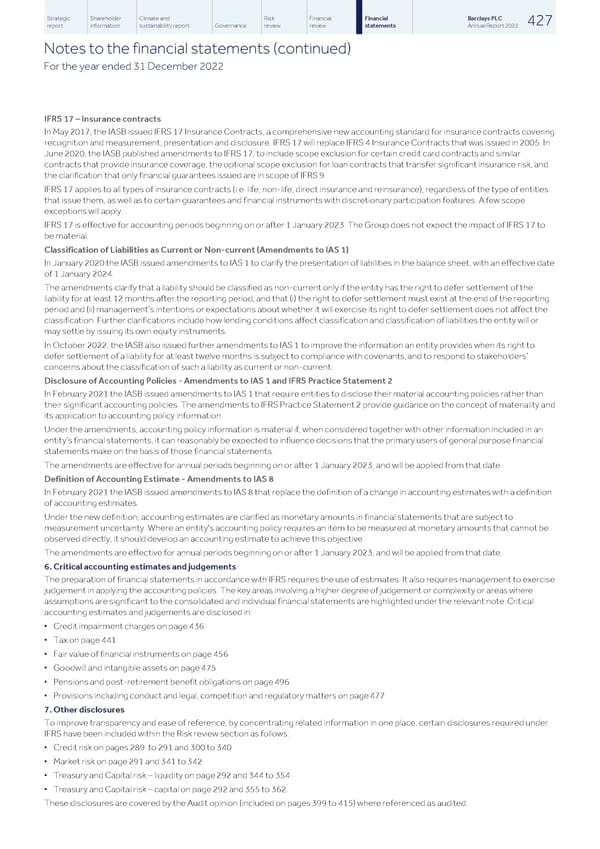Strategic Shareholder Climate and Risk Financial Financial Barclays PLC 427 report information sustainability report Governance review review statements Annual Report 2022 Notes to the financial statements (continued) For the year ended 31 December 2022 IFRS 17 – Insurance contracts In May 2017, the IASB issued IFRS 17 Insurance Contracts, a comprehensive new accounting standard for insurance contracts covering recognition and measurement, presentation and disclosure. IFRS 17 will replace IFRS 4 Insurance Contracts that was issued in 2005. In June 2020, the IASB published amendments to IFRS 17, to include scope exclusion for certain credit card contracts and similar contracts that provide insurance coverage, the optional scope exclusion for loan contracts that transfer significant insurance risk, and the clarification that only financial guarantees issued are in scope of IFRS 9. IFRS 17 applies to all types of insurance contracts (i.e. life, non-life, direct insurance and reinsurance), regardless of the type of entities that issue them, as well as to certain guarantees and financial instruments with discretionary participation features. A few scope exceptions will apply. IFRS 17 is effective for accounting periods beginning on or after 1 January 2023. The Group does not expect the impact of IFRS 17 to be material. Classification of Liabilities as Current or Non-current (Amendments to IAS 1) In January 2020 the IASB issued amendments to IAS 1 to clarify the presentation of liabilities in the balance sheet, with an effective date of 1 January 2024. The amendments clarify that a liability should be classified as non-current only if the entity has the right to defer settlement of the liability for at least 12 months after the reporting period, and that (i) the right to defer settlement must exist at the end of the reporting period and (ii) management’s intentions or expectations about whether it will exercise its right to defer settlement does not affect the classification. Further clarifications include how lending conditions affect classification and classification of liabilities the entity will or may settle by issuing its own equity instruments. In October 2022, the IASB also issued further amendments to IAS 1 to improve the information an entity provides when its right to defer settlement of a liability for at least twelve months is subject to compliance with covenants, and to respond to stakeholders’ concerns about the classification of such a liability as current or non-current. Disclosure of Accounting Policies - Amendments to IAS 1 and IFRS Practice Statement 2 In February 2021 the IASB issued amendments to IAS 1 that require entities to disclose their material accounting policies rather than their significant accounting policies. The amendments to IFRS Practice Statement 2 provide guidance on the concept of materiality and its application to accounting policy information. Under the amendments, accounting policy information is material if, when considered together with other information included in an entity’s financial statements, it can reasonably be expected to influence decisions that the primary users of general purpose financial statements make on the basis of those financial statements. The amendments are effective for annual periods beginning on or after 1 January 2023, and will be applied from that date. Definition of Accounting Estimate - Amendments to IAS 8 In February 2021 the IASB issued amendments to IAS 8 that replace the definition of a change in accounting estimates with a definition of accounting estimates. Under the new definition, accounting estimates are clarified as monetary amounts in financial statements that are subject to measurement uncertainty. Where an entity's accounting policy requires an item to be measured at monetary amounts that cannot be observed directly, it should develop an accounting estimate to achieve this objective. The amendments are effective for annual periods beginning on or after 1 January 2023, and will be applied from that date. 6. Critical accounting estimates and judgements The preparation of financial statements in accordance with IFRS requires the use of estimates. It also requires management to exercise judgement in applying the accounting policies. The key areas involving a higher degree of judgement or complexity or areas where assumptions are significant to the consolidated and individual financial statements are highlighted under the relevant note. Critical accounting estimates and judgements are disclosed in: ▪ Credit impairment charges on page 436 ▪ Tax on page 441 ▪ Fair value of financial instruments on page 456 ▪ Goodwill and intangible assets on page 475 ▪ Pensions and post-retirement benefit obligations on page 496 ▪ Provisions including conduct and legal, competition and regulatory matters on page 477. 7. Other disclosures To improve transparency and ease of reference, by concentrating related information in one place, certain disclosures required under IFRS have been included within the Risk review section as follows: ▪ Credit risk on pages 289 to 291 and 300 to 340 ▪ Market risk on page 291 and 341 to 342 ▪ Treasury and Capital risk – liquidity on page 292 and 344 to 354 ▪ Treasury and Capital risk – capital on page 292 and 355 to 362. These disclosures are covered by the Audit opinion (included on pages 399 to 415) where referenced as audited.
 Barclays PLC - Annual Report - 2022 Page 428 Page 430
Barclays PLC - Annual Report - 2022 Page 428 Page 430